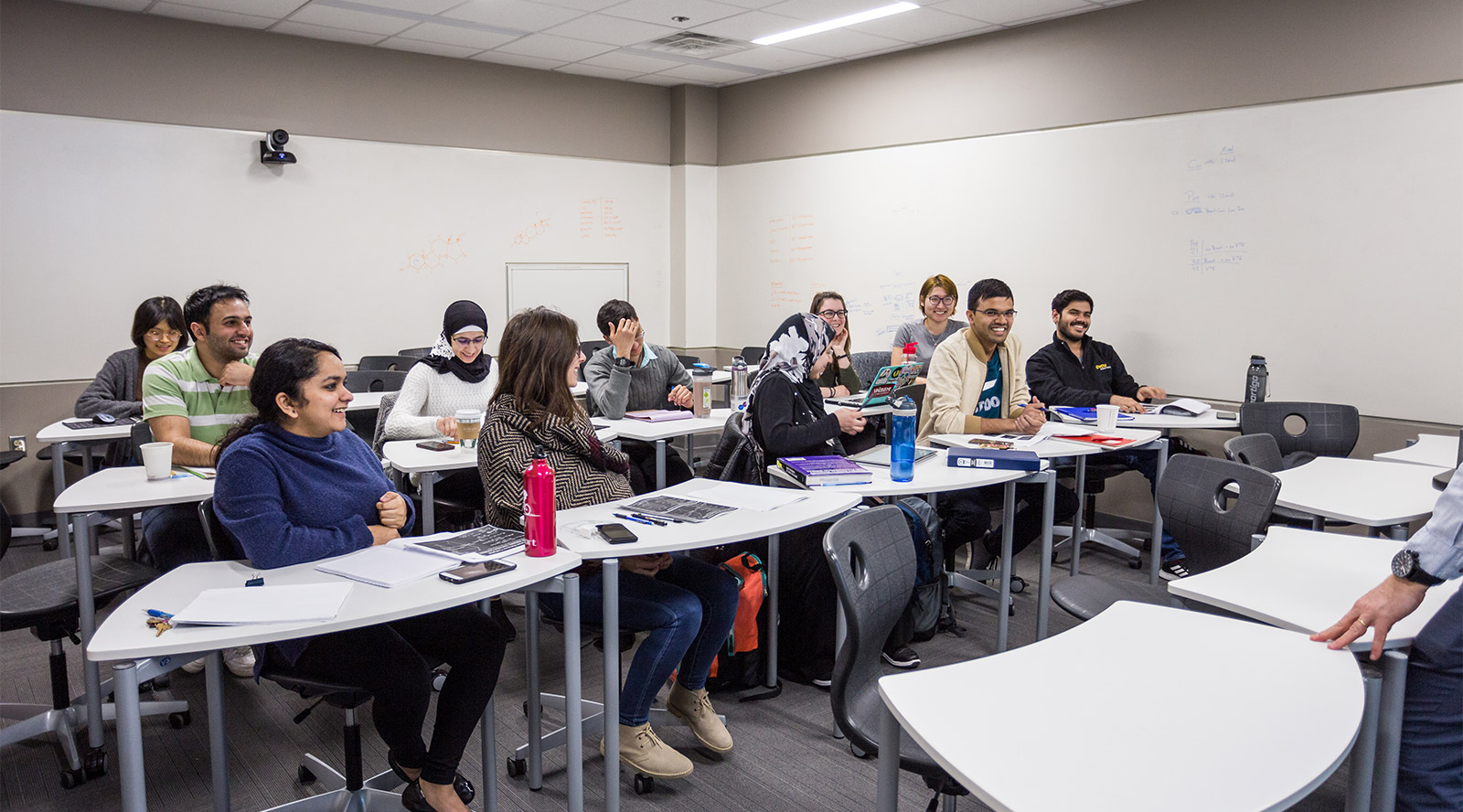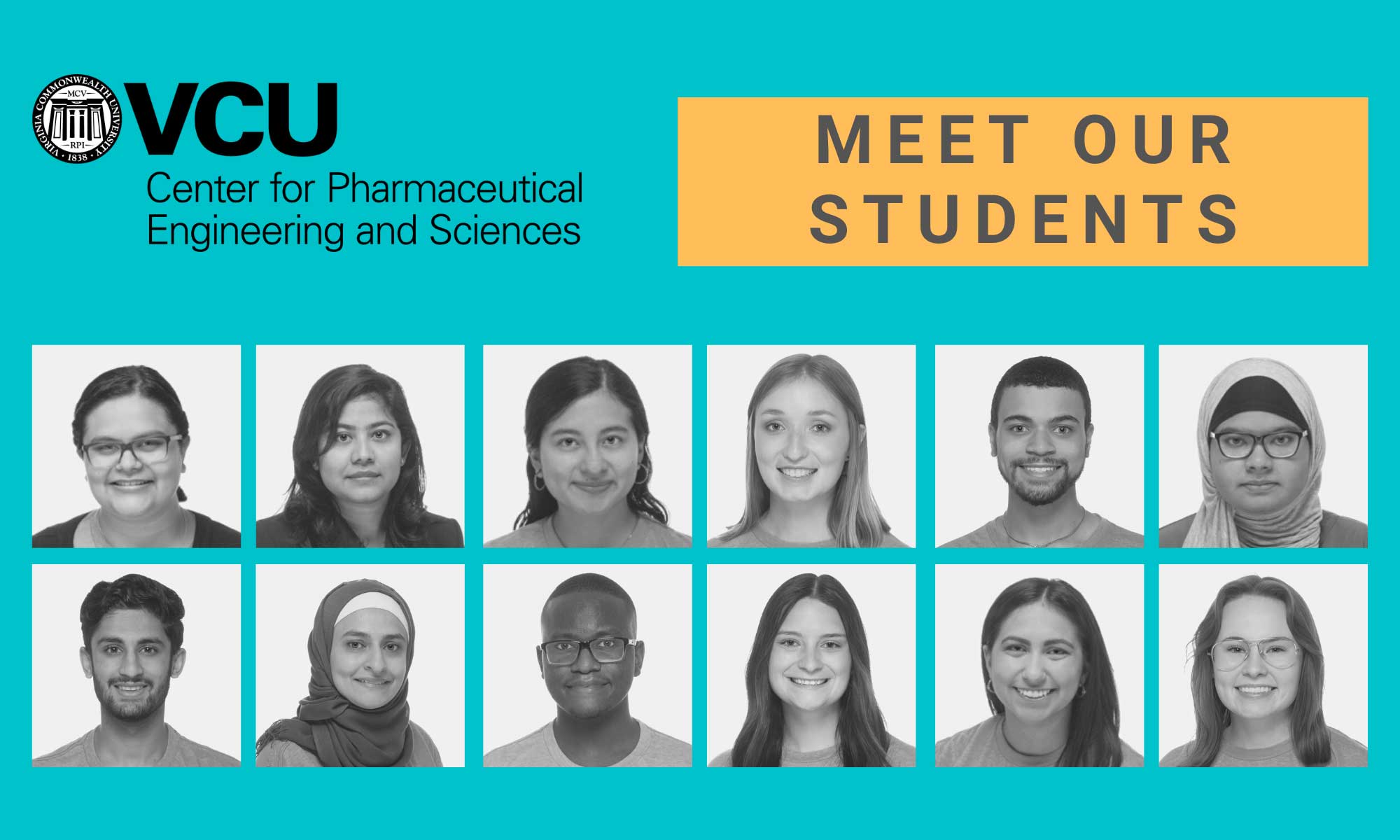
First Ph.D. of its kind in the nation
The State Council of Higher Education for Virginia just approved the nation’s only Ph.D. in pharmaceutical engineering at VCU. Contact us for more information at pharmeng@vcu.edu.
Scientists who graduate from this Ph.D. program will be highly competitive. They will be involved in cutting-edge research and a multidisciplinary curriculum that includes all aspects of drug development.
— Jay Holt, Ph.D.
Vice President, Inhalation R&D, Aurobindo
Pharma
Preparing students to address current needs and future challenges in the discovery, development and production of safe and effective pharmaceutical products.
About Pharmaceutical Engineering
Housed in the Center for Pharmaceutical Engineering and Sciences at VCU, the Ph.D. in pharmaceutical engineering is the first of its kind in the nation, and a collaboration between the School of Pharmacy and College of Engineering at VCU.
Mission
Our mission is to provide a collaborative and team-based experience to our students so as to prepare the future generation of science and engineering leaders in the field of pharmaceuticals.
Vision
We aspire to engage our graduate students in convergent science and engineering approaches to help solve complex emerging problems and anticipate future needs in pharmaceutical engineering.
The Program
The pharmaceutical engineering Ph.D. program will prepare students to respond to current, emerging and future challenges in the discovery, development and production of pharmaceutical products. The pharmaceutical engineering Ph.D. program will prepare students to respond to current, emerging and future challenges in the discovery, development and production of pharmaceutical products. The program will prepare talent and leaders who can pursue careers in industry, regulatory and nonprofit agencies, as well as academic settings that deal with drug products. The students will engage in a rigorous and cross-disciplinary educational experience that includes foundational and research area specific coursework be empowered with the necessary tools to formulate and answer hypotheses-driven research questions in collaboration with mentors that have special expertise; engage in professional development opportunities to effectively promote and disseminate their work; and be immersed in a research and innovation environment of excellence.
The program will address the growing need for a new generation of researchers trained in cross-disciplinary and interdisciplinary science who recognize the need for a team-based approach to solving challenges related to the design and manufacturing of pharmaceutical products.
Graduates will gain the necessary skills and scientific foundation to work in a team-based environment, seek entrepreneurial solutions, and effectively communicate concepts and results. The program will prepare students to work and innovate in areas that create medicines to improve human health including the pharmaceutical industry, medical nonprofits, universities and regulatory authorities.
Historically, many areas of pharmaceutical discovery, development and manufacturing have existed without the use of expertise in the area of pharmaceutical engineering. However, there has been an increased focus on product quality to ensure patient safety, reduction of manufacturing costs, and the design of complex and novel pharmaceutical products that requires a convergent approach in order to solve such complex problems.
Examples of products, processes and therapies that will benefit from the application of pharmaceutical engineering concepts include:
- Automated discovery technology
- Inhaler device design and formulation
- Continuous processing
- Development of drug products containing nanomedicines
- Long-acting and personalized medicines
The VCU Bulletin is the official source for academic course and program information.
Research Mentors
Directors
Research Members
Research Members
Admissions
Qualified applicants with diverse backgrounds are encouraged to apply to the Ph.D. in Pharmaceutical Engineering Program at VCU. Students with a bachelor’s degree in science or engineering are most likely to have the appropriate science and math background to succeed in the program. Those include, but are not limited to, biological sciences; (bio)chemistry; pharmacology; pharmaceutical sciences; chemical, biomedical and mechanical engineering; and related disciplines.
Admission is based on (i) academic excellence; (ii) leadership potential; (iii) research experience; (iii) letters of recommendation; and (iv) personal interview.
Important Dates – Application/Admissions Timeline
- Applications for Fall are now open!
- Applicants who submit their application by January 15 will be considered first.
- The admissions committee will review all applications and invite students for virtual and/or in-person interviews.
- Final admissions decisions will start soon after the application deadline and will continue until all offers have been made.
Graduate Student Funding
Top candidates admitted to the program will be offered funding that covers tuition and fees, and a stipend for living expenses.
Support for the admitted Ph.D. students may come from various sources, including
- VCU Graduate School
- VCU School of Pharmacy funds
- VCU College of Engineering funds
- Faculty federally funded projects (NIH, NSF, DOD) and other local, state and governmental agencies
- Internal fellowships
- External fellowships
All students that matriculate to our program and are eligible are strongly encouraged to apply for pre-doctoral fellowships.
The Ph.D. in pharmaceutical engineering currently does not offer an M.Sc. track.
Graduate fellowships
Student initiated
- American Association of Pharmaceutical Scientists Graduate Student Fellowships
- American Foundation for Pharmaceutical Education (APFE)
- American Foundation for Pharmaceutical Education Pre-Doctoral Fellowship in Pharmaceutical Sciences
- F30 Ruth L. Kirschstein Individual Predoctoral NRSA for MD/PhD and other Dual Degree Fellowships
- F31 Ruth L. Kirschstein Predoctoral Individual National Research Service Award
- National Institutes of Health Ruth L. Kirschstein Individual Predoctoral NRSA for MD/PhD and other Dual Degree Fellowships
- National Institutes of Health Ruth L. Kirschstein National Research Service Award Individual Predoctoral Fellowship to Promote Diversity in Health-Related Research
- National Science Foundation Graduate Research Fellowship Program
- Pharmaceutical Research and Manufacturers of America Foundation, Inc. Foundation Pre-Doctoral Fellowship: Pharmaceutics
- Ruth L. Kirschstein National Research Service Award (NRSA) Individual Predoctoral Fellowship to Promote Diversity in Health-Related Research (Parent F31-Diversity)
PI-initiated
Curriculum
The courses in the curriculum ensure that students receive the necessary didactic instruction that will enable them to excel in the development of cutting-edge research in pharmaceutical engineering. The curriculum is highly flexible. It consists of a combination of core courses, research area elective courses, and elective courses that provide both breadth and depth of knowledge to the students. The curriculum also offers an opportunity to engage in other activities including entrepreneurship, and directed research, where students will develop their dissertation under the supervision of a faculty member, which represents another opportunity for students to delve in a specific area (depth of knowledge) while at the same time developing their professional skills. Students needing additional preparation will be offered courses to cover prerequisites (prerequisite courses) so as to provide all a chance to succeed in the program irrespective of their backgrounds.
The prerequisite and core courses will provide students with the interdisciplinary foundational knowledge in pharmaceutical engineering and sciences. In these courses, the students will acquire knowledge of the various phases of drug product development including the identification of drug targets, the discovery, synthesis, processing, manufacturing and control of active pharmaceutical ingredients (APIs), the engineering and formulation science of APIs into dosage forms, as well as regulatory affairs. These foundational courses will provide the students with the necessary analytical, problem-solving and critical thinking skills necessary to tackle innovative research projects.
The research area elective didactic courses will provide students advanced, cutting-edge knowledge tailored to elevate the quality of their research projects and their depth in a specific area of research within pharmaceutical engineering. All students will choose a research focus area in which VCU and its faculty are nationally and internationally recognized. These courses will be selected in consultation with the mentors and will need approval by the program directors.
The elective courses in the proposed program will provide students with an avenue to either further their depth of knowledge in cutting-edge science and engineering, or to take on new courses that may promote related aspects of their professional development such as entrepreneurship classes, or to seek experiences at collaborating institutions such as summer internships at governmental agencies (for example the FDA), industry, other laboratories within or outside VCU or other nonprofits. These courses will be selected in consultation with the mentors and will need approval by the program directors.
Directed research courses will be used by the students to complete their theses in the chosen research area. During directed research courses, with active mentoring by the faculty, students will use the knowledge acquired from the various didactic courses in pharmaceutical engineering to identify critical need areas in the field, and to develop a hypothesis-driven research plan to address the emerging needs in the area, thus leading to innovative drug products.
The VCU Bulletin is the official source for academic course and program information.
Programs
Educational programs supporting our mission and goals.
The School of Pharmacy’s goal is to provide the highest quality graduate education and research training in the pharmaceutical sciences. The graduate faculty consists of internationally recognized scientists and the school consistently ranks in the top 20% of NIH funding among pharmacy programs in the U.S.
We are the oldest pharmacy school in Virginia, tracing our roots back to 1898. Our primary teaching facilities are located on the Medical College of Virginia Campus in Richmond, the state capital. We are 1 of 18 academic health science centers nationwide meaning that our campus has four other health sciences schools and a major academic health center with several hospitals and clinics that offer tremendous opportunities for hands-on patient care. Moreover, we have satellite campuses at Inova and the University of Virginia extending our reach and providing additional perspectives on healthcare delivery. We partner with seven community organizations that welcome student pharmacists who are interested in areas such as geriatrics, cardiology, mental health, ambulatory care and underserved communities. Most importantly, we believe our students will help shape the future of healthcare. Take the time to get to know us and see what we have to offer.
The VCU College of Engineering, an innovation front-runner in academics and research, brings real-world education to Central Virginia. Our collaborative and multidisciplinary partnerships prepare students for leadership. Part of a premier research university, the VCU College of Engineering enhances regional and global prosperity through cutting-edge developments in tissue engineering, drug delivery, bioinformatics, cybersecurity, mechanical systems and particle science. We make it real by turning great ideas into breakthrough technologies.
The VCU College of Engineering has state-of-the-art facilities and faculty members with international reputations. These assets translate into amazing research opportunities for emerging scholars.
The graduate program at VCU Engineering gives you the opportunity to bridge undergraduate and career experiences by working on cutting-edge research in an interdisciplinary environment. Our faculty and students are connected with colleagues across the globe who share our vision of interdisciplinary research and discovery. We have an active graduate student association where students build social connections and academic/professional networks through seminars, workshops and social events.
Diversity Statement
“Diversity is among our greatest assets at VCU, and our effort to create and sustain an equitable and inclusive environment is the best approach toward leveraging this asset into universal excellence and success.” -- Aashir Nasim, Ph.D., vice president for inclusive excellence
Students with Disability Services
VCU provides accommodations to ensure students with disabilities have equal educational opportunities and experiences. For more information please check the following links:

